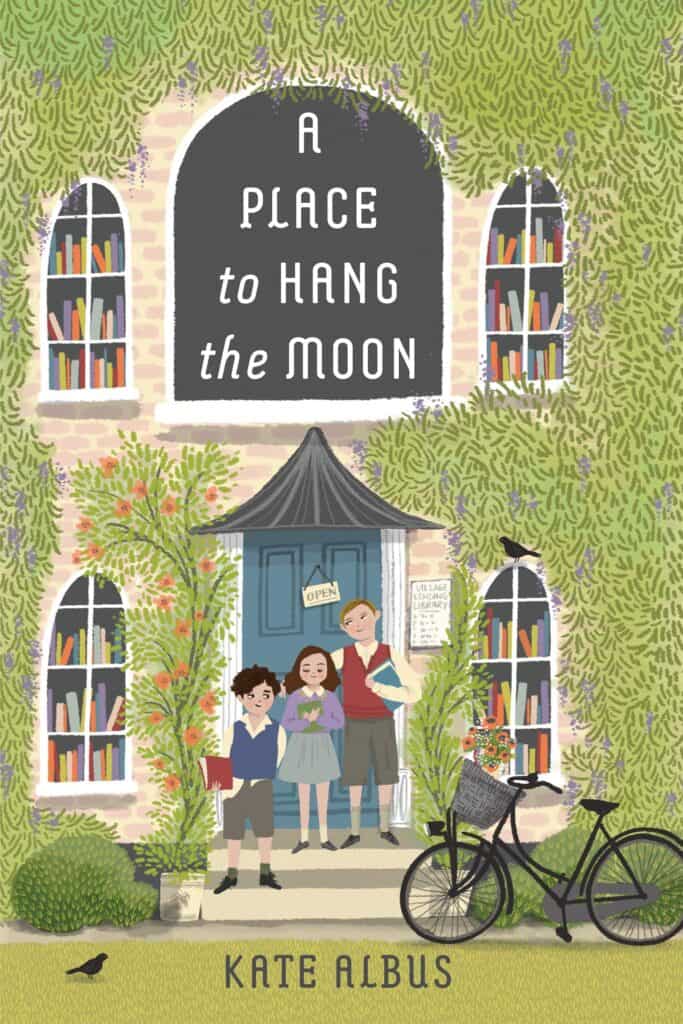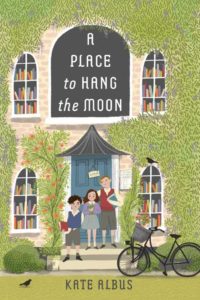A PLACE TO HANG THE MOON by Kate Albus
Margaret Ferguson Books, Holiday House (2021)
Just the warm cozy I needed on the last chilly weekend of 2021…
Set in the midst of WW2 England, the book opens with William (12), Edmund (11) and Anna (9) orphaned and without a guardian. Due to the war, their solicitor devises a plan: the children are to evacuate to the country with other school children and make a favorable impression on whatever family takes them in so that when the war is over, the family will want to keep them forever. They can’t tell anyone about their grandmother’s death or their inheritance, though, until they find a place they all agree upon. They wouldn’t want to be taken advantage of. The plan is preposterous, but the children seem to have no choice. In the country, they face the fear of being separated, bullies (both adult and children), discrimination for being “Vackies” (evacuated outsiders), and hunger and cold due to neglect as they’re moved from family to family. But they find solace in the local library, the books that they love, and the kind librarian, Mrs. Müller, who they all think would make an excellent billet. But she is married to a German whose whereabouts are unknown, and townspeople have deemed her unsuitable. Will the children find a forever family? This lovely story is a beautiful ode to family, perseverance, and the healing power of books.

Reading this book called to mind the feeling of being wrapped in a cozy blanket in front of a fire with a hot cup of cocoa. Of coming home after a long wander. While wholly compelling and unique, A Place to Hang the Moon also felt nostalgically familiar. So much of that feeling of delight and comfort has to do with the omniscient narration, which is the buried treasure in this read.
In 3rd person omniscient narration, the narrator knows everything about everyone, including what they are feeling, thinking and wanting. The narrator themselves is a character in the book, coming between the reader and the character, reminding the reader that the story is, after all, not real. It was the preferred view point of the 19th century, but has fallen out of favor in recent years with the rise of close 3rd and 1st person POVs. Perhaps one reason it is out of style is that it is incredibly hard to write—if handled poorly, it can distance the reader from the story and make it difficult for the reader to connect to the character and the emotion of the book. But if handled well, the experience is the exact opposite. A reader who is confident in the narrator will trust them with the reigns to their attention and be able to relax, breathe, and lose themselves in the emotion of the story. And that is exactly the kind of experience Kate Albus gives her readers in A Place to Hang the Moon.
Why would a writer choose to write in Omniscient POV? One reason is that it gives the writer the ability to steer the reader’s attention with greater control, allowing the reader to contemplate events and meaning instead of simply character. A Place to Hang the Moon is as much about the idea of home and the meaning of family as it is about William, Edmund, and Anna. Consider this passage:
“But affection is not the same thing as proper family love. This sort of love, the children knew only from one another—and from books. Over many pages, each of them had cobbled together a sense of what the family of their dreams might look like.
When Edmund thought about such things, there was a good deal of swashbuckling involved. His story book father was a cowboy in the Wild West, though he did some pirating when his travels took him seaward. Mum was not much different. She cared little for the washing of ears—or of anything, come to that—and she allowed him both his own horse and his own rifle.
. . . Where Edmund envisioned chocolate cake for breakfast, William wished for a perfectly poached egg on buttered toast—served in bed if he was ill, and in the garden if the weather was fine. The storybook mums and dads he coveted were the reliable ones. The ones most likely to think it wrong for a boy of twelve to be responsible for anything more than excelling at his studies, keeping his bedroom tidy, and being polite when company came to call.
Oddly—or perhaps not oddly at all if you give it some thought—the mum Anna pictured was not unlike William. She was kind, of course. She read stories—that goes without saying—and she was comfortable to sit upon when she read them. She abided no nonsense unless nonsense was precisely what was required. She was there with a fervent embrace with a fervent embrace was the only thing that could make it better. And she was there with—well, she was there.”
In this gorgeous passage, Albus knows everything about Edmund, William, and Anna—their desires, their dreams, and their hurts. She is aware of the reader and even addresses them (“if you give it some thought”) and deepens the reader’s knowledge of each individual. But this passage accomplishes far more than simple character development via the omniscient narrator: by commenting upon the children’s imaginings from above, Albus causes the reader to contemplate their common need for a family. In doing so, she drives home the theme and the meaning of the book: what family looks and feels like. Instead of distancing the reader from the story, the narrator invites them in as if sharing a secret, creating a reading experience that is both entertaining and emotionally satisfying. A Place to Hang the Moon will hold its own on shelves, fitting nicely among other WWII evacuee stories like Goodnight, Mr. Tom by Michelle Magorian, Children of the King by Sonya Hartnett, and The War that Saved My Life by Kimberly Brubaker Bradley.
Interested in reading more books written in 3rd person omniscient POV? Check out The Penderwicks by Jeanne Birdsall and The Vanderbeekers of 141st Street by Karina Yan Glaser




